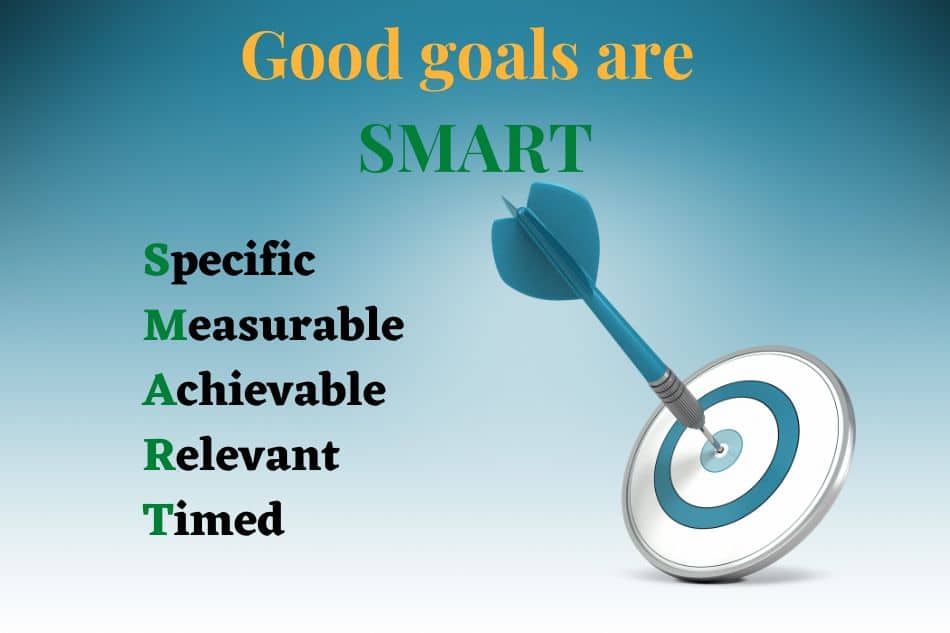All of my ESL students say they want to learn English as soon as possible. But many of them don’t know precisely what they want to achieve. Since learning is a lifelong process, so you must have a specific goal.
To set goals to learn English, you must identify your present and target level first. Then set some short and long goals as well as an ultimate goal to learn English. Your goals should be specific, achievable, and timed so that you can measure your success.
Setting goals is the first step in turning the invisible into the visible.
Tony Robbins

Suppose Razib and Russel are two ESL students, and both of them are asked the same question.
What’s your goal regarding learning English?
Razib says, “I am very much interested to learn English.”
Russel says, “I want to achieve a B2 level in the next six months.”
Do you see the difference? Razib has the desire to learn English without any specific target. On the other hand, Russel has a particular goal that mentions both level and time frame.
A clear goal gives you a purpose and helps you find the best direction. Also, when you have a goal with a deadline, it allows you to make a proper action plan.
I have seen many ESL students feel demotivated just after a few weeks because of having no specific target. As a result, they lose track of their progress and stop moving forward. However, having a goal can help you stay motivated until the deadline.
Here are some tips to help you set short- and long-term goals and achieve them.
Know About CEFR to Identify Your Current and Target Level
CEFR refers to the Common European Framework of Reference for Languages. It is a guideline to describe the ability of foreign language learners, especially across Europe and increasingly in other countries.
The CEFR describes language proficiency in six levels—A1, A2, B1, B2, C1, and C2. We can regroup them into three broad classes: Basic User (A1, A2), Independent User (B1, B2), and Proficient User (C1, C2).
Here I present how one can identify their level depending on the language competence determined by CEFR.
| CEFR Levels | Abilities |
|---|---|
| A1 (Complete Beginner) | Able to communicate about familiar topics in a simple way Able to understand short conversations about everyday life with people who speak slowly and clearly |
| A2 (Elementary) | Able to make themselves understood and talk about routine situations Able to ask questions and answer them with concrete information about topics familiar to them |
| B1 (Lower-Intermediate) | Able to express themselves coherently regarding events, experiences, and plans Able to justify their decisions on a wide range of topics. Able to understand the main points of a conversation when standardized language is used, and the focus is on topics of personal interests and familiar themes such as work, school, leisure, and traveling |
| B2 (Upper-Intermediate) | Able to comprehend the main points of complete texts on a wide range of concrete and abstract topics Able to communicate themselves clearly and discuss the advantages and disadvantages of various options and positions fairly sophisticatedly |
| C1 (Advanced) | Able to understand longer and more challenging texts in detail and grasp implicit meanings Able to have spontaneous conversations without being lost for words.Able to use the language in their social and professional lives |
| C2 (Fluency Level) | Able to effortlessly understand almost everything they hear or read Able to express themselves spontaneously about any topic without making noticeable grammatical errors |
Now, from the table, you can easily find out your current level of English. Once you know where you are, find where you want to go. Set your ultimate goal.
Set Yourself Realistic Short and Long-term Goals
Yes! It’s crucial to set goals if you want to learn English. Most ESL students certainly would agree that goals are essential, yet they sometimes fail to set them. Sometimes their goal becomes unrealistic, and as a result, they fail and get frustrated.
Suppose your level of English is A1, and you want to achieve a level of C1 in a few weeks. In that case, it is unrealistic unless you are an extraordinary genius with a photographic memory.
However, while setting goals, you can ask yourself the following questions, and based on the answers, you can select your goals.
- What English proficiency level do you want to achieve?
- How long can you give the effort to achieve that?
- Can you give your best to achieve it?
- Is it too much for you to achieve?
- Can you keep track of your progress?
No one knows you better than yourself. Depending on the answers, you can now establish realistic long and short-term goals. Remember! Good goals are SMART:

Here are some examples of Long-term and short-term goals. You are advised to set your long-term goals based on your requirements. Then, once you are sure about that, you can split them into short-term goals.
| Examples of Long-term goals | Examples of Short-term goals |
| Achieve B2 level in the next eight months | Give ten minutes to learn vocabulary and pronunciation. Talk to an English-speaking friend once a week. Write something in the journal every day. Take a listening test every Sunday. Watch, read, or listen to any English content for 10 minutes daily. Take a monthly progress test. Visit the ESL Advice Community every day. Attend ESL classes twice a week. |
Make a Study Plan Based on Your Goals
Once you have determined your goals, it’s time to make a study plan. Now you know what to achieve and when to achieve it. You can make a daily routine depending on your weekly and monthly targets. Be very specific about your targets and do your best to achieve them.
I have written numerous blogs on this site, where you can find hundreds of activities to improve your English.
However, if you are a beginner, you may also check English for Everyone: Beginner Box Set – Level 1 & 2 (Amazon Link) to practice at home. This illustrated version is really helpful for beginners who believe in self-learning. Also, if you are an intermediate or advanced ESL learner, you can find your version here (Amazon link)
Find your best suitable ways of learning and do your planning in your comfort. Don’t take too much stress.
Here is a sample of the planning. Remember! This is not ideal for everyone, as the strategy may vary depending on the learner’s target and time frame. So, make your own and go forward with that.
| Month | Week | Day |
| January 2022: Learn 350+ new words. Listen to 8-10 audiobooks. Listen to the radio for 2 hours. Read 8-10 short stories. Learn about 8-10 topics from www.esladvice.com. Practice speaking in English for 12-14 hours. Listen to 8-10 podcasts. Watch 4-5 English movies/tv shows/web series. Write 4000-5000 words. Note: Make a plan for the other months of the year based on your short and long-term targets. | Week 1: Learn 50-60 new words (With meaning and use). Listen to 2 audiobooks (Novel/Novella). Listen to the radio for 30 minutes. Read 2 short stories (Printed/Kindle/PDF). Learn expressions on 2 topics from www.esladvice.com. Speak in English for 3 hours. Listen to 2 podcasts. Watch 1 English movie. Write 1000-1200 words in my journal on my daily activities. Note: Make a plan for the other weeks of the month based on your short and long-term targets. | Day 1 (Saturday) Learn 10 new words in context with meanings and use of them. Listen to half of an audiobook (Fiction). Read 1 short story (Printed/Kindle/PDF). Learn How to Get to Know Each Other in English from ESL Advice. Speak to a friend in English for 10-15 minutes. Write everything that happened today in your journal (Around 200 words). Note: Make a plan for the other days of the week based on your short and long-term targets. |
As you can see in the sample study plan above, there are some specific monthly, weekly, and daily targets. Look at the digits. When you have numbers in mind, it proves that you are very specific about your targets.
Set your monthly targets based on your ultimate or long-term goals. And set weekly and daily targets based on short-term goals. You should keep your goals written somewhere, in a journal or on a whiteboard that is hung on your room’s wall.
You may also use The Work-Smart Academic Planner: Write It Down, Get It Done (Amazon link) to keep them in a well-organized format.
Suppose you have taken a mission to reach a certain level of English in 6 months. As you already know, your target, split your total time into 6 months. Then, divide every month into 4 weeks and every week into 7 days.
So you have six months/24 weeks/180 days to achieve your goal. Now determine your short-term goals to contribute to the long-term goals.
You must keep track of your monthly targets. Find a suitable way to assess your monthly achievement. If all the monthly targets, or at least 80% of them, are achieved, you are on the right track. Keep going on. Whenever you look at your achievements, you will feel motivated to move on.
Think twice if you cannot achieve 80% of the monthly targets. Are your goals SMART? Are they realistic? Rethink yourself and find the right path and make realistic targets. Don’t stress yourself. Take your time and keep faith in the saying, “Slow and steady wins the race.”
Make a Daily Routine: From Waking Up to Going to Bed
You can either make a routine for 24 hours or only the hours of study. However, I always recommend my students make learning English a lifestyle. Thus I suggest making a 24 hours plan while making a daily routine. Here is a sample of my recommended daily routine for MONDAY.
Of course, depending on your availability and needs, you can make your one. Like the MONDAY routine, you can make the daily routine for other days of the week with variations in your activities.
MONDAY:
- Breakfast – at 7:30 AM
- Study English at home – at 8:00 AM
- Listen to English Audiobooks on the car ride to work – at 9:00 AM
- Begin work at the office – at 10:00 AM
- Leave office – at 6:00 PM
- Listen to English songs on the car ride home – at 6:00 PM
- Take a rest – at 7:00 PM
- Study English at home – at 7:30 PM
- Dinner – at 9:00 PM
- Watch English Movies – at 9:30 PM
- Go to bed – at 11:30 PM
Remember! This is not an ideal routine for everyone. Therefore, your MONDAY routine can be different. Also, your MONDAY may vary from TUESDAY.
So make your own routine. You will find several activities to improve your English if you regularly visit my blog. Incorporate them into your daily, weekly, and monthly plans.
Plan, Execute, Repeat, and Achieve
Once your plan is set, you must go for execution with utmost determination. A plan is nothing at all until it is executed. There are more people to plan, but only a few can execute their plans properly.
We all know that practice makes things perfect. As language learning is a process, you should plan, execute and repeat the same.
For example, if you plan that this week I will learn 50 new words and can successfully do it, should you stop there? Will you not continue the process? You should repeat the same endeavor and memorize 50 words every week. If you can follow these three steps—plan, execute and repeat, only then you can expect achievements.
Reward Yourself for Achieving Short-term Goals
Self-motivation in self-learning is essential as it is the only force that can drive you to do things and achieve your goal. Learning English or any skill can be frustrating if you only look at your mistakes rather than what you have done right.
To keep yourself motivated, you must focus more on your accomplishments rather than your failure. Rewarding yourself for achieving short-term goals can surely motivate you to move forward toward your ultimate goals—the long-term goals.
Suppose you had a short-term goal, like reading an English novel this week. Once you are done with it, don’t you deserve a reward? YES, you do. What can you gift yourself?
Since you have improved your English with your hard work, you can reward yourself with something that can take you closer to your ultimate goal.
Here are some ideas for rewarding yourself for achieving short-term goals. Of course, you can think of your reward except for the following ideas.
- Watch an English movie at a cinema hall
- Buy some English novels for you
- Buy a special notebook on which you would love to write in English
- Have a special meal at home or outside etc.
Keep Track of Your Short-term Goals
Keeping track of what short-term goals you have achieved and are yet to achieve next is very important for achieving the ultimate goals. I recommend making yourself accountable, so you don’t lose track.
Whatever goals you have set, you can share them with your close friends or family members so that you have someone to remind you about your plans.

But remember! You should not depend on anyone else rather than yourself. They can only help you but cannot do things on your behalf. You have to fight your own battle.
You can ask for help from your friends and family to help you keep track of your progress. Once you have completed any short-term goals, you can share your achievements with them. Their smiling face and happiness can motivate you more.
Besides, you can track your progress by yourself in different ways. Here are some ways you can follow.
- Keep a notebook to keep track of your daily English learning activities, or hang a whiteboard to do the same.
- Make a weekly checklist that shows what you have accomplished and what to accomplish.
- Use habit tracker apps like “Way of Life” to track your daily activities.
Check all the practice sheets at the end of the week, and track your progress.
In Conclusion
Learning English requires accomplishing many small steps and finally reaching the ultimate goal. Only a specific purpose can help you do the right things in a planned manner. You should fix your aim and act accordingly.
However, I must tell you one thing: there are no absolutely perfect goals. Even there are no “right” or “wrong” goals. The goal that is right for you may appear wrong for others. Not everyone is with the same ability and passion.
The only thing is that you should try your best and believe in your goals. You must see yourself at the end of your success while setting your goals.
I hope if you can set your goals to learn English following the above tips, you will certainly discover a different you within a very short time.
Thanks for reading.
Happy learning! Good luck.





